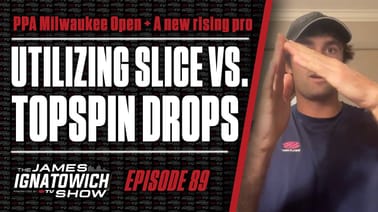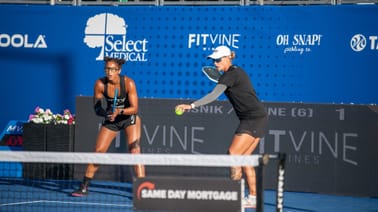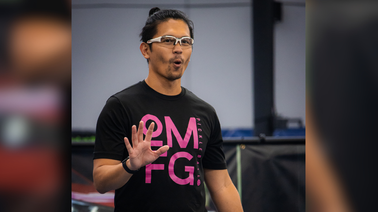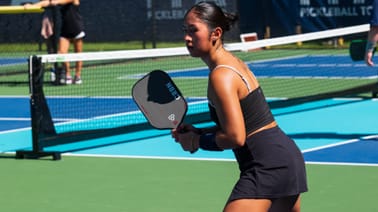
Wander onto any bustling pickleball court, and you'll soon realize there's a lot more to this rapidly growing sport than just paddles, a wiffle ball, and the unmistakable ping sound of rapid-fire rallies.
For the uninitiated, these areas may seem chaotic or unruly. After all, you have players everywhere, some even gathered behind a fence or off to the sides of the courts. You may even notice a rack lined with paddles.
Get your special someone the #1 pickleball gift for Valentine's Day. Now 25% off
This is open play. And it's known as the quintessential way to play pickleball everywhere.
Whether you're new to open play or a crafty veteran who can be seen dropping shots at your local gathering spot several nights a week, this guide is here to help you navigate open play, expose you to some of the unwritten rules, and even offer some tips that can elevate your game to a whole new level.
Etiquette in Open Play
Etiquette in pickleball is as crucial as it is in any social setting. It’s about more than just politeness; it's the grease that keeps the well-oiled machine of open play running smoothly. Let's explore the three main pillars of pickleball etiquette.
Respect for Court Rotation
One of the cardinal rules of pickleball is court rotation. Rotating in and out of the game is customary, giving everyone a fair chance to participate fully.
Take Our Rating Quiz to Find Your Rating
If you're waiting for your turn, stand at the back of the court or off to the side and enjoy interacting with your fellow pickleballers. Players often use an adopted system (paddle rack, four-paddle stacks, etc.) that ensures everyone gets an equal opportunity to play. Be sure and familiarize yourself with it before simply wandering onto the court to avoid dirty looks or getting yelled at by your fellow players.
Communication with Partners
When it comes time to play, there's a very good chance you'll be paired up with someone you haven't played with before (or at least very little). Clear and concise communication is essential for a good game. Calling "yours" or "mine" during on-court play can ensure you're both on the same page, which helps play go more smoothly but can also help prevent you from running into each other.
Be a Good Teammate
Sometimes, you'll team up with someone with a notable lack of skills (to put it nicely). It happens to us all. You have two choices – roll your eyes every time they make a mistake or encourage them to play to the best of their ability and make sure they leave feeling good about their decision to pick up a paddle that day.
Perhaps the best thing to do in these situations is to remind yourself that you were also a beginner at one point, and it's very likely that you were teamed up with someone who didn't appreciate the number of missed overheads or serves into the net you provided. Be a good teammate.
Of course, if it's too much of a struggle, politely sit out a match or two to reset the rotation for a new partner next time around.
The Unwritten Rules of Open Play
Alongside official regulations, pickleball has a series of unspoken guidelines that shape the experience for players. Abide by these, and you'll find the pickleball world far more welcoming and enjoyable.
Sportsmanship and Fair Play
Winning at all costs at the expense of sportsmanship rarely goes well in pickleball circles. Players should make honest calls and exhibit good conduct even under the pressures of a competitive match. In a game where you are your own referee, be a fair one.
Player Conduct and Attitude
Temper and ego have no place on a pickleball court. Respecting your fellow players, as well as the game itself, is paramount. Project a positive and approachable attitude, and you'll often find the favor returned, creating an enjoyable atmosphere.
Sign up today for the most informative newsletter in pickleball from The Dink!
The pickleball community is growing rapidly but is still tight-knit, and word passes around quickly. Everyone will know if you're not someone who's great to play with, and your chances of getting quality games will likely decrease over time. Just don't be that person.
Mastering Pickleball Strategy
"It's a game of chess, not checkers." Ask anyone who has played pickleball for any amount of time, and you'll start to understand there is much more to the game than driving the ball as hard as you can or dinking endlessly crosscourt. Open play is a great opportunity to work on your game, so remember to focus on your strategy, not just your shots.
Shot Placement and Court Positioning
Effective shot placement involves observing your opponents, finding their weak spots, and smartly placing your shots in open spaces. If a player has shoddy footwork, pull them out wide. If someone can't handle a lob, send it flying over their heads.
Game Improvement: Seven Things You Should do to go from a 3.0 to 3.5.
Noticing the strengths and weaknesses of other players can help you build a strategy to win more matches when it counts.
Serve and Return Strategies
Optimizing your serves and return of serve can provide an edge from the first point. Discover techniques to serve and surprise your opponent, and refine your return game to keep control of the pace and direction of the rally.
Reading Opponents and Adjusting Gameplay
Adaptability is key in pickleball, as every opponent brings their unique style to the court. Learn to read the body language and strategy of those across the net, and quickly adjust your style to keep them guessing. The easiest opponent is a predictable one.
How to Best Use Open Play
Except for your ego, wins and losses don't matter in open play. Ideally, you use open play to improve your game and meet some new people or just have a great time playing pickleball. It's best to remember those things when you step out onto the court. Sure, you're going to get competitive, and there will be someone across from you from time to time that you really want to bodybag, but resist the urge to take open play too seriously too often.
Game Improvement: Seven Things You Should do to go from a 3.0 to 3.5.
While pickleball, at its core, is about having fun and getting a good workout, it also serves as a social hub for many players. Etiquette and unwritten rules are the invisible hands that maintain the spirit of the game. Adhering to these standards contributes to a vibrant and inviting community that encourages players to be their best on and off the court.









